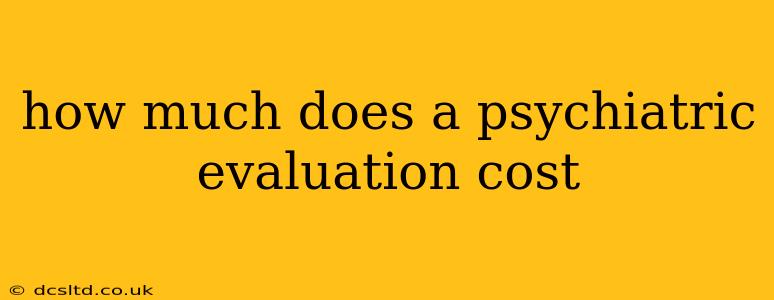How Much Does a Psychiatric Evaluation Cost? A Comprehensive Guide
The cost of a psychiatric evaluation varies significantly depending on several factors. There's no single answer, as the price can range from hundreds to thousands of dollars. Understanding these influencing factors is crucial to budgeting appropriately and securing affordable care.
What Factors Determine the Cost of a Psychiatric Evaluation?
Several factors influence the final cost of a psychiatric evaluation:
-
Type of Provider: Psychiatrists, psychologists, and other mental health professionals all offer evaluations, but their fees differ. Psychiatrists, who can prescribe medication, generally charge more than psychologists or other licensed therapists. The level of experience and specialization of the provider also impacts pricing.
-
Location: Geographic location plays a significant role. Evaluations in urban areas or regions with high costs of living tend to be more expensive than those in rural areas.
-
Insurance Coverage: Health insurance plans vary widely in their coverage of mental health services. Some plans cover a significant portion of the evaluation cost, while others may have high deductibles, co-pays, or limited coverage for certain types of evaluations. Always check your plan's specifics before your appointment.
-
Length and Complexity of the Evaluation: A brief screening may cost less than a comprehensive evaluation that includes extensive testing, interviews with family members, or review of medical records. The complexity directly correlates to time commitment and thus, the cost.
-
Additional Services: The evaluation might include additional services like psychological testing (e.g., personality tests, IQ tests), which will increase the overall expense.
How Much Can I Expect to Pay Out-of-Pocket?
Without insurance, you're looking at a wide price range. A short initial consultation might cost between $150 and $300, while a more thorough evaluation, encompassing testing and multiple sessions, could easily exceed $1000. This is a broad estimate, and the actual cost depends on all the previously listed factors.
What About Insurance Coverage?
Many insurance plans cover at least a portion of psychiatric evaluations. However, understanding your plan's specifics is crucial. This includes:
- Deductible: The amount you must pay out-of-pocket before your insurance begins covering services.
- Copay: The fixed amount you pay for each visit.
- Coinsurance: Your share of the costs after you meet your deductible.
- In-network vs. Out-of-network providers: Using in-network providers (those within your insurance company's network) will usually result in lower out-of-pocket costs.
What are My Options if I Can't Afford a Private Evaluation?
Several options exist for individuals who cannot afford a privately billed evaluation:
- Community Mental Health Centers: These centers often offer sliding-scale fees based on income, making services more accessible to low-income individuals.
- University-Based Clinics: Many universities with psychology or psychiatry departments offer evaluations at reduced rates, often supervised by experienced professionals.
- Non-profit Organizations: Numerous non-profit organizations provide mental health services, some of which offer evaluations on a sliding scale or for free.
How Long Does a Psychiatric Evaluation Take?
The length of a psychiatric evaluation varies widely. A brief initial consultation may only take 30-60 minutes, while a comprehensive evaluation, including testing, could take several hours spread across multiple sessions.
What Happens During a Psychiatric Evaluation?
A psychiatric evaluation typically involves a thorough interview covering your medical history, mental health history, current symptoms, family history, and lifestyle factors. Depending on the evaluation's scope, it might also include psychological testing.
This information is for general knowledge and shouldn't replace advice from a mental health professional or your insurance provider. Always contact potential providers directly to inquire about their fees and insurance policies. Your financial health should never prevent you from accessing crucial mental health care.
